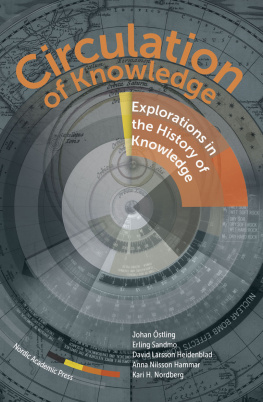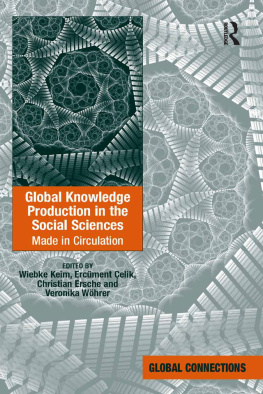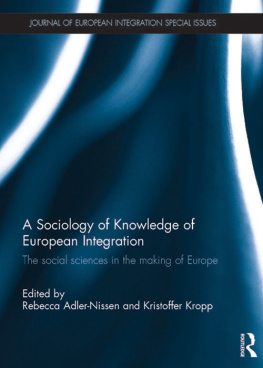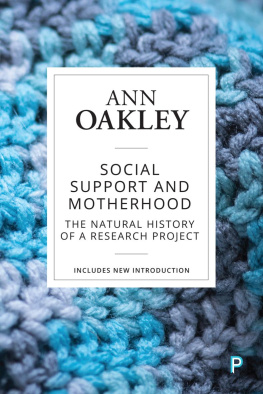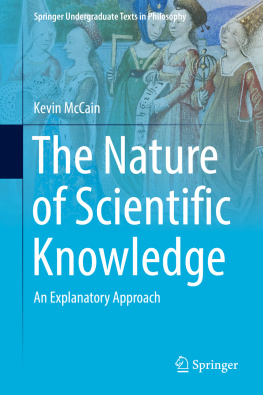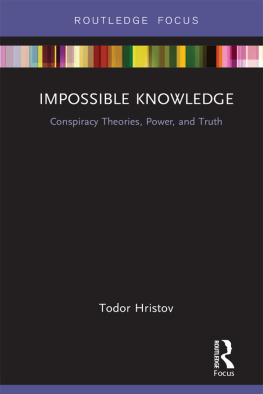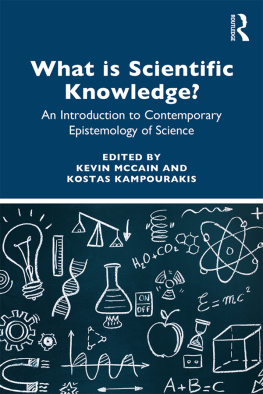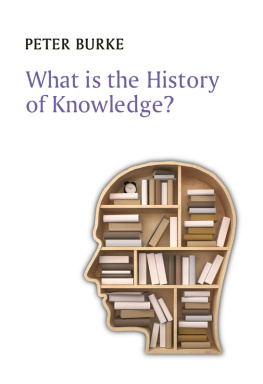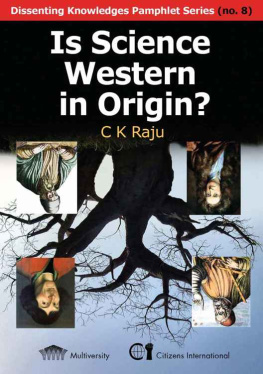Acknowledgements
This volume began with an intellectually rewarding workshop on the circulation of knowledge as a theoretical framework and an analytical tool, held at beautiful Hckeberga Castle on 1819 August 2016. We wish to thank the contributors to this book and Brita Brenna, Charlie Jrpvall, Gustav Holmberg, Johanna Skurnik, Kenneth Nyberg, Sine Halkjelsvik Bjordal, Solveig Jlich, and Svein Atle Sklevg, and Riksbankens Jubileumsfond, which generously funded the meeting.
In recent years, we have benefitted enormously from discussions with scholars whom we have met at conferences and seminars in Lund, Volda, Sundsvall, Uppsala, Stockholm, lborg, and elsewhere. Some of them have enriched our understanding of what the circulation of knowledge might mean; others have shown a more general interest in our endeavour to explore the history of knowledge.
Riksbankens Jubileumsfond has financially supported the production of this book. Annika Olsson at Nordic Academic Press has been a helpful and enthusiastic guide through the whole process, and Charlotte Merton has been our meticulous copy-editor. We thank them all.
Lund and Oslo
Johan stling,
Erling Sandmo,
David Larsson Heidenblad,
Anna Nilsson Hammar
& Kari H. Nordberg
About the authors
Anders Ahlbck is a research fellow at the University of Helsinki and reader in Nordic History at bo Akademi University. His areas of expertise include the history of masculinities and civilmilitary relationships as well as the history of universities. He is the author of Manhood and the Making of the Military (2014) and co-author of the centenary history of bo Akademi University (2018).
Erik Bodensten is a postdoctoral researcher at the Department of History, Lund University. He has written on Swedish eighteenth-century political thought, and is researching early modern subsidies and public opinion. His publications include the dissertation Politikens drivfjder (2016) and The Problems with Receiving Subsidies, in Svante Norrhem & Erik Thomson (eds.), Subsidies, War, and Peace (2018).
Kajsa Brilkman is a postdoctoral researcher at the Department of History, Lund University. Her research concerns the Reformation and Lutheran confessional culture in northern Europe in the sixteenth and seventeenth centuries, with a special focus on book production, the book market, and translations. Her publications include Translating Luther at the Beginning of the Reformation in the Swedish Kingdom, in Violet Soen et al., Transregional Reformations (2018).
Isak Hammar is a postdoctoral researcher at the Department of History, Stockholm University. His current research interests include classical reception studies and the history of the humanities. He has recently published articles on the rhetorical use of antiquity in the early Swedish environmental debate and on the study of ancient languages and literature as a tool for moral education in early nineteenth-century Sweden.
Laura Hollsten is a university lecturer and reader at bo Akademi University. Her work is situated between environmental history and the history of science and knowledge. Among her recent publications is the centenary history of bo Akademi University (2018).
Susann Holmberg is a doctoral student at the University of Oslo. Her PhD project concerns the history of knowledge, and specifically knowledge of venereal diseases in early modern DenmarkNorway.
Helge Jordheim is Professor of Cultural History at the University of Oslo and Professor II of German at the Norwegian University of Science and Technology, Trondheim. He has published extensively on eighteenth-century intellectual culture in Europe, especially in Germany and France, as well as on the theory and history of the humanities. His latest book is a monograph co-written with Margrit Pernau and others on the concepts of civility and civilization in Europe and Asia (Civilizing Emotions, 2015).
David Larsson Heidenblad is a postdoctoral researcher in history at Lund University. His research centres on the history of modern environmentalism and of knowledge. Recent publications include A Classical Tragedy in the Making, International Journal of the Classical Tradition (2017) and Mapping a New History of the Ecological Turn, Environment and History (2018).
Anna Nilsson Hammar is a postdoctoral researcher at the Department of History, Lund University. She has written on the transformation of happiness, conscience, virtue, and morality in early modern Sweden, on the theory of history, and on digital history. Her latest publications include the digital Guide to the Special Collections of Lund University Library (2015) and she is currently writing a monograph on conflicts of conscience in early modern Sweden.
Kari H. Nordberg is an Associate Professor at the Department of Culture, Religion, and Social Studies, University College of Southeast Norway. Her research interests include the history of sexuality, education history, and historiography. Her PhD thesis (2014) was on the history of sex education in Norway.
Johan stling is an Associate Professor and Senior Lecturer in History at Lund University. He has written extensively on modern European history, in particular intellectual history and the history of knowledge. His recent publications include Sweden After Nazism (2016) and Humboldt and the Modern German University (2018).
Camilla Ruud is senior adviser at the Norwegian Museums Association. She has been a postdoctoral fellow at the University of Oslo, and has published extensively on the early modern history of knowledge and material culture. Her recent publications include There is not one single thing that resembles this one, Nordic Journal of Science & Technology Studies (2014) and Enacting Disease, Arv (2016).
Erling Sandmo is Professor of History at the University of Oslo and researcher at the Norwegian National Library. He has written extensively on cultural history in early modern Europe, and especially on law, music, knowledge, and historiography. The English translation of his latest book, Monstrous: Sea Monsters in Maps and Literature, 14911895, will be published in 2018.
CHAPTER 1
Public, private, and experience-based knowledge
Cholesterol knowledge in circulation in Finnish society, 19702010
Laura Hollsten
Public health concerns are an important driving force in producing new knowledge about the human body. The scientific paradigms of the day and socioeconomic conditions have always influenced the ways in which this knowledge has been created, distributed, and received. It is because of its bearing on public health that knowledge about cholesterol has been of great societal and economic significance in the late twentieth century. Knowledge of this substance, produced by the human body, has also been of deeply personal interest for individuals concerned about their health.
Knowledge of cholesterol has circulated in the media since the Seven Countries Study, which investigated coronary heart disease and stroke in seven countries in 19561970. The cornerstone of this knowledge has been the lipid hypothesis, which links high cholesterol levels with cardiovascular diseases, and is widely accepted within the medical community. The lipid hypothesis has become the governing paradigm in explaining cardiovascular disease, to the extent that researchers refer to it as the lipid consensus.
This essay investigates the circulation of knowledge about cholesterol in Finnish society by analysing a variety of sources such as scientific articles, newspaper articles, public debates, and blog posts. The objective is not to give an account of the cholesterol debate, but rather to chart the patterns of the circulation of knowledge. Thus the primary sources have been selected to cast light on the various strands of knowledge in circulation. The so-called fat debate in the largest newspaper in Finland,
Next page
